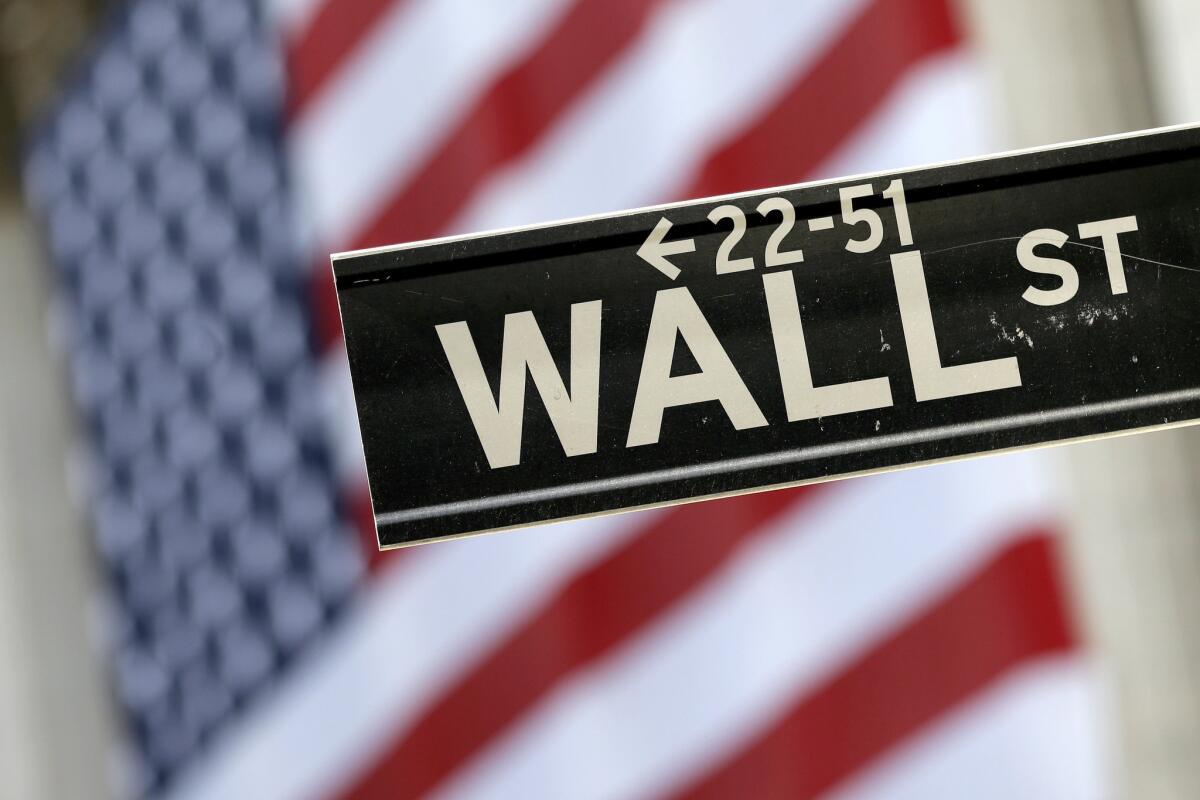Stocks close nearly unchanged; energy firms fall, but hotels jump

U.S. stocks barely budged Monday, finishing mixed: Lower oil prices pulled energy companies down, but hotels and travel-related companies rose.
Trading was quiet ahead of the Federal Reserve’s meeting this week, which is expected to shed some light on the possibility of a future increase in benchmark interest rates.
“Lately [the market] seems to quiet down ahead of the Fed,” BlackRock portfolio manager Peter Stournaras said.
U.S. stocks missed out on a global rally that lifted stocks in Europe and Asia. The Standard & Poor’s 500 index fell for just the second time this month.
The Dow Jones industrial average rose 15.82 points, or 0.1%, to 17,229.13. The S&P 500 edged down 2.55 points, or 0.1%, to 2,019.64. The Nasdaq composite index edged up 1.81 points to 4,750.28.
Starwood Hotels jumped after a consortium led by China’s Anbang Insurance Group offered to buy the hotel chain for $14 billion. Last year Marriott International agreed to buy Starwood for $12.2 billion. Starwood said it will examine the new offer, and its stock jumped 7.8% to $75.93.
Marriott stock rose 3% to $70.93. The company will get a $400-million payment if Starwood backs out of their agreement.
The news lifted other travel-related companies. TripAdvisor climbed 4.5% to $66.54, and Expedia rose 1.3% to $116.39.
C. Patrick Scholes, analyst for SunTrust Robinson Humphrey, said investors in Expedia and TripAdvisor are hoping Starwood will be sold to Anbang instead of competitor Marriott. He said that if Marriott and Starwood were to combine, they would have more power to negotiate lower commissions with the online travel agencies. “If there’s no deal, that strength and bargaining power is taken away,” he said.
Host Hotels also outperformed the market, rising 1.4% to $16.87. Scholes said Anbang’s offer suggests that foreign buyers are still interested in U.S. hotel companies.
Energy and materials stocks fell with the prices of oil, gas and precious metals.
The price of oil tumbled after Iran’s oil minister dismissed the idea of a freeze in production. U.S. benchmark crude fell $1.32, or 3.4%, to close at $37.18 a barrel in New York. Brent crude, the global benchmark, fell 86 cents, or 2.1%, to $39.53 a barrel in London. Southwestern Energy sank 6.7% to $7.46 and Chesapeake Energy gave up 6.8% to close at $4.38.
The Federal Reserve is scheduled to meet Tuesday and Wednesday. Investors don’t expect the Fed to raise interest rates, but they will look closely at its comments on the state of the U.S. and global economies to get clues about possible moves in the future. In December, the Fed raised interest rates for the first time in almost a decade, but it left them unchanged in January.
Stocks have rallied over the last four weeks, and BlackRock’s Stournaras noted that some of the most beaten-down parts of the market, including energy and mining companies, have made major contributions to that rally as economic indicators, especially in the U.S., have begun to improve. That means those stocks could tumble again if investors don’t like what the Fed has to say about the economy or global growth this week, he said.
Big gainers Monday included Fresh Market, which jumped 23.5% to $28.39 after private equity firm Apollo Global said it would buy the grocery store chain for $1.3 billion, or $28.50 per share.
Drug developer GW Pharmaceuticals’ shares more than doubled after the company reported positive results from a late-stage study of its drug Epidiolex, an experimental seizure disorder treatment derived from a marijuana extract. The stock surged 120% to $84.71. Zynerba Pharmaceuticals, which is studying drug based on synthetic compounds derived from cannabis, soared 149% to $21.03.
Stocks in Europe rose after the eurozone had its biggest monthly increase in industrial production since 2009. Germany’s DAX rose 1.6%. France’s CAC 40 added 0.3% and Britain’s FTSE 100 gained 0.6%.
Chinese stocks rose after the chief of the China Securities Regulatory Commission said over the weekend that it’s too early to talk about winding back official support measures for the markets, according to the official Xinhua news agency. That suggests the government will continue to support Chinese equities.
Japan reported a jump in private-sector machinery orders, a sign that capital spending could improve this year. Japan’s benchmark Nikkei 225 index rose 1.7%.
South Korea’s Kospi was little changed. Hong Kong’s Hang Seng added 1.2% and the Shanghai Composite Index in mainland China gained 1.8%.
In other energy trading, wholesale gasoline fell 2 cents to $1.42 a gallon and heating oil sank 2 cents to $1.20 a gallon. Natural gas fell less than a penny to $1.82 per 1,000 cubic feet.
In metals trading, the price of gold fell $14.30, or 1.1%, to $1,245.10 an ounce. Silver fell 8.4 cents to $15.52 an ounce. Copper was little changed at $2.24 a pound.
Bond prices rose. The yield on the 10-year Treasury note slipped to 1.96% from 1.98%. The euro declined to $1.1097 from $1.1157 late Friday. The dollar edged up to 113.80 yen from 113.70 yen.
ALSO
Wild box office for ‘Zootopia’ in China as the film hits $112 million in 10 days
Why ‘dynamic’ pricing based on real-time supply and demand is rapidly spreading
Oriental DreamWorks creative chief decamps for new Huayi animation branch in China






